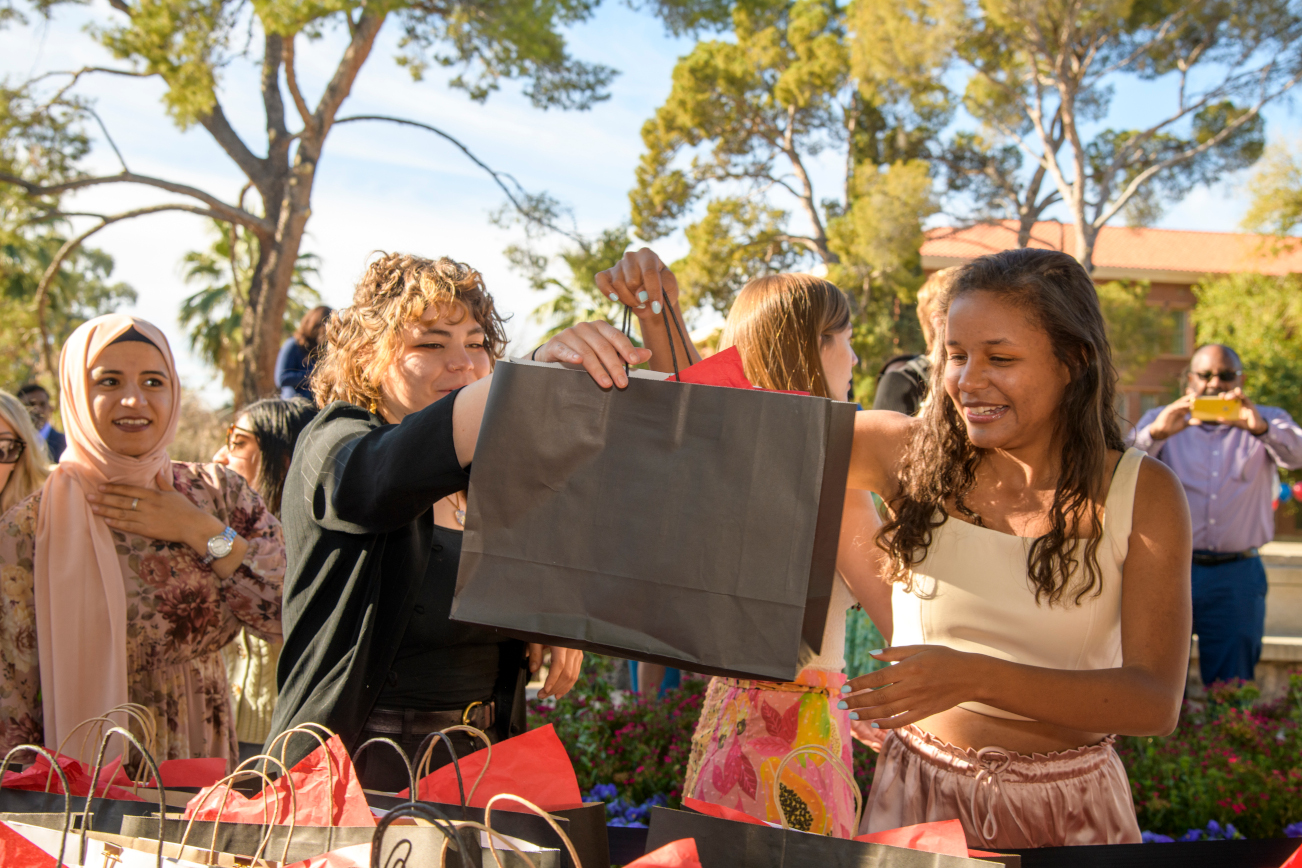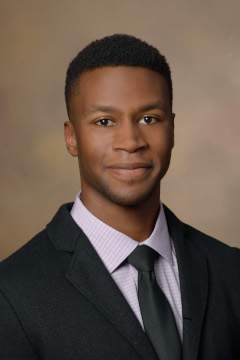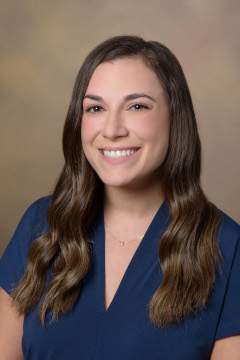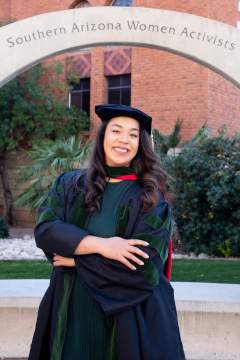
At Match Day 2022, fourth-year medical students pick up bags containing envelopes revealing where they have been matched for residency programs. (Photography by University of Arizona Health Sciences Communications, Kris Hanning)
At this year’s Match Day ceremony, to be held Friday, March 17, on the west side of the Old Main Building on the University of Arizona campus, 110 medical students from the University of Arizona College of Medicine – Tucson will learn where they will complete the next phase of their medical training.
Surrounded by loved ones and in coordination with fourth-year medical students attending similar events across the country, students in their final semester of medical school will simultaneously tear open envelopes at 9 a.m. The contents will reveal where they will begin their residency, a three-to-seven-year stage of graduate medical education where new doctors practice medicine in their chosen specialty under the supervision of a senior medical clinician. Match Day represents a culmination of four years of intense study, volunteering, research, clerkships, sub-internships and clinical rotations for UArizona College of Medicine – Tucson students.
During their last year of medical school, students interview for residency slots at institutions where they hope to receive further training. Students later rank their residency location preferences, while institutions rank the students they would like to have as trainees. The match process is completed by the National Residency Matching Program, and medical students are obligated to serve at the institution to which they have been matched.
“Match Day is the most anticipated event for medical students and for COM-T administration and faculty as we all find out where our students will be pursuing their graduate medical education during the next phase in their journey to become an independently practicing physician,” said Kevin Moynahan, MD, vice dean for education at the College of Medicine – Tucson and a professor of medicine in the Section of General Internal Medicine at the Department of Medicine. “This day is the cumulation of four or more years of hard work, resiliency and professional identity formation. The college is proud to send our well-trained graduates to prestigious graduate medical education programs around the country and to welcome a significant number into our own residency programs.”
Registration and breakfast begin at 7:30 a.m., with programming starting at 8:15 a.m. At 9 a.m., students will individually gather with their supporters to open their Match Day envelopes, and at 9:30 a.m., they will announce their matches publicly. Closing remarks begin at 11 a.m.
Parking is available ($8 per car) at the Tyndall Garage, located on Tyndall Avenue south of University Boulevard. There is an accessible drop-off area for people with disabilities on University Boulevard at the flagpole west of Old Main.
Those wishing to attend the event virtually can view the livestream at https://satyrlivestream.com/stream/match-day-2023/. For more information and to RSVP, visit the College of Medicine – Tucson Match Day website.
Below are just a few of the outstanding medical students in the College of Medicine – Tucson’s Class of 2022:
Ike Royal Chinyere, PhD: ‘A deep respect for the heart’
 Ike Royal Chinyere, PhD, was born and raised in a small city on Route 66 in northwestern Arizona. The son of Nigerian immigrants who both work in health care, he didn’t intend to follow in his parents’ career footsteps — but he loved his anatomy and physiology classes.
Ike Royal Chinyere, PhD, was born and raised in a small city on Route 66 in northwestern Arizona. The son of Nigerian immigrants who both work in health care, he didn’t intend to follow in his parents’ career footsteps — but he loved his anatomy and physiology classes.
“Starting in high school, I developed a deep respect for the heart and its intricacies,” Dr. Chinyere says. “The heart is the pump at the center of us all, and accomplishes an amazing job every single day, hour and minute of our lives.”
Now he’s poised for an incredible career after his time at the University of Arizona College of Medicine – Tucson, which awarded him a bachelor’s degree in honors physiology in 2017 and a doctorate in cardiac electrophysiology in 2020.
Throughout his time in Tucson, he has been mentored by Steven Goldman, MD, professor of cardiology, and Elizabeth Juneman, MD, interim chief of cardiology, first as an undergraduate research specialist, when he contributed to the creation of a system to screen new drugs for toxic side effects, particularly for patients at risk of heart disease. The system is an improvement on the current gold-standard screening system used by many drug manufacturers and the Food and Drug Administration.
After completing his undergraduate studies, Dr. Chinyere had multiple options for medical school — but he chose to stay here, enrolling as a dual MD/PhD student.
“I realized that my project in the Goldman Lab was once in a lifetime,” he recalls. “I stayed on board, and it’s been very fruitful.”
During his doctoral studies, Dr. Chinyere performed preclinical studies of an engineered biomaterial that could be implanted onto the heart’s surface to help restore its electrical stability after a heart attack. The experience solidified his interest in helping patients through entrepreneurship.
“Entrepreneurship fits into how I approach my goals as a physician-scientist in training. Utilizing both degrees is my main goal,” he says. “I believe it is my calling to simultaneously employ all of these skillsets to make a difference in patients’ lives.”
Dr. Chinyere has applied for a select number of residency programs that will further develop him as a physician-scientist, and will pursue a career in cardiac electrophysiology, focusing on the electrical properties of the heart. Such a practice would allow him time in the hospital and clinic, treating patients with arrhythmias, and time in the lab to develop better devices — such as next-generation surgical biomaterials and other novel devices and techniques — to better treat patients with heart disease.
Dr. Chinyere is looking forward to celebrating Match Day with his wife and young son.
“I enjoyed my time here and met a lot of amazing people, and there are a lot of good memories,” he says. “I feel very excited that medical school is coming to an end, and very motivated for the next chapter.”
Gabrielle Milillo: ‘This is what I was meant to do’
 Gabrielle Milillo is eager to find out where she’ll begin her residency training in pediatrics — the next step on a journey she’s been on since her childhood in Phoenix, where some of her most vivid memories took place in the doctor’s office.
Gabrielle Milillo is eager to find out where she’ll begin her residency training in pediatrics — the next step on a journey she’s been on since her childhood in Phoenix, where some of her most vivid memories took place in the doctor’s office.
“I really idolized my pediatrician. I valued the partnership she made with my family and her commitment to helping me grow as a person and as a patient at the same time,” she remembers. “She brought a sense of genuine excitement and energy to every visit. It didn’t feel like work for her — she truly loved it!”
Four years of medical school, and exposure to a variety of other specialties, couldn’t sway Milillo from her instincts. She says pediatrics is still the most electrifying of all the specialties.
“What I love about pediatrics is the ability to work with patients at the most transformative moments of their life, being able to contribute to their development in a positive way,” she says.
Milillo says she was attracted to the College of Medicine – Tucson because she felt the school reflected her own values.
“I resonated with its mission of advocating for the more vulnerable patient populations within our Tucson community and beyond,” she says. “These values really shine through in the training and the opportunities we receive at the College of Medicine – Tucson.”
Milillo took advantage of those opportunities during the last two years of medical school, completing rotations in several underserved and rural areas — an experience that she says strengthened her convictions about becoming a compassionate physician.
“I witnessed firsthand how money, insurance, geography and language barriers all can negatively impact an individual’s care,” she says. “I hope to be a culturally aware physician who embraces the diversity of my community and addresses these barriers to health care access head on.”
As a recipient of the Primary Care Physician Scholarship, Milillo will practice in Arizona after completing her residency.
“The scholarship took away the financial burden of tuition and allowed me to focus on the specialty that I cared about most, instead of choosing a specialty that was going to pay the most,” she says. “That was amazing.”
Milillo is participating in the “couples match” to receive training in the same region as her partner, who is also completing his medical degree.
“I met my partner at the beginning of medical school,” she says. “To end it all with the opening of the envelope and to continue our life together is incredible. I don’t know what city we’ll end up in, but I’m excited to explore with him.”
The couple will celebrate Match Day with their families.
“Opening up that envelope at the same time, knowing that we’re all bonded in that moment, is really special,” she says. “It will be a sense of relief, knowing that this is what I was meant to do.”
Kaloni Peleketi Philipp: ‘I’m excited to see where I end up’
 Kaloni Peleketi Philipp grew up in Mesa, Arizona, the daughter of immigrants from Tonga.
Kaloni Peleketi Philipp grew up in Mesa, Arizona, the daughter of immigrants from Tonga.
“They came here to give us a better opportunity,” she says. “They worked so hard and were able to fulfill the American dream.”
Philipp was the first in her family to attend college — but when she was 19, her father had a stroke. She dropped out to support her father on his journey to recovery.
“My dad regained function and was able to return to work. I kept working and helping out at home,” she recalls. “Then, about seven years later, he had a second stroke and passed away.”
It was a galvanizing experience.
“It felt like I needed to do more,” she says. “I needed to understand why he died.”
Soon after, Philipp enrolled in community college, falling in love with physiology. A teacher told her the University of Arizona offered a degree in the field, so Philipp met with a community-college counselor to learn more. It didn’t go as planned.
“He told me it was a really hard major and I should consider something easier,” she recalls. “I didn’t know anyone else who graduated from college and could tell me otherwise, so I believed him.”
Luckily, her teachers were more encouraging, and one of them hired Philipp to work for the college as an anatomy and physiology tutor.
“That really boosted my confidence. I kept plugging away,” she says. She disregarded the counselor’s advice. “I ended up going to the University of Arizona, majoring in physiology.”
After graduation, Philipp was accepted to medical school through P-MAP (Pre-Medical Admissions Pathway), an intensive medical school preparation program for promising students who have faced considerable obstacles. She shared her acceptance letter with counselors at her old community college, where her example was used as a reminder to recognize the potential of all students.
Philipp excelled in medical school. In addition to conquering her challenging courseload, she developed leadership skills as co-chair on the Student Diversity Committee and the Asylum Clinic. She co-founded Polynesians in Medicine, a nationwide organization that supports Pacific Islander pre-med students as they work through the pipeline toward medical careers.
Initially interested in obstetrics and gynecology, Philipp pivoted to family medicine.
“I loved OB, but I wanted to know about the other parts of their life. It’s important to me to build long-term relationships,” she says. With those deeper connections, her goal is to improve care for underserved people. “I want to explore ways to get them into doctors’ offices to prevent a lot of the chronic conditions and complications that we’re seeing in that population.”
She will celebrate Match Day with her husband, along with family members from the Phoenix area.
“It’s the culmination of years and years of work,” she says. “I’m excited to see where I end up.”

